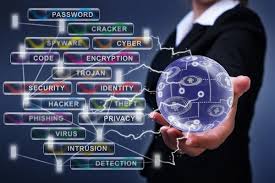Staying Safe in the Digital Age
Introduction
The internet has transformed the way we communicate, work, and entertain ourselves. However, with its growth comes the increasing threat of cyberattacks, making cybersecurity an essential aspect of our digital lives. This article explores the significance of internet usage, the dangers posed by cyber threats, and best practices for staying safe online.
The Evolution of the Internet
The internet has come a long way from its early days as a military and academic network. Today, it serves as the backbone of global communication, powering businesses, education, healthcare, and entertainment. The rise of e-commerce, cloud computing, and social media has made it an integral part of our daily routines.
The Role of the Internet in Modern Society
- Business and Economy: Companies rely on digital platforms for marketing, communication, and transactions. Learn more about digital business strategies
- Education: Online learning platforms provide access to knowledge across the globe. Explore top online education platforms
- Healthcare: Telemedicine and digital health records have improved patient care and efficiency.
- Social Interaction: Social networks, messaging apps, and video conferencing help people stay connected.
Understanding Cybersecurity
Cybersecurity refers to the protection of digital systems, networks, and data from cyber threats. As technology advances, so do the tactics of cybercriminals, making cybersecurity a critical concern for individuals and organizations alike.
Common Cyber Threats
- Phishing Attacks – Fraudulent emails and messages that trick users into revealing personal information.
- Malware – Malicious software such as viruses, ransomware, and spyware designed to disrupt systems or steal data. Read about the latest malware threats
- DDoS Attacks – Distributed Denial of Service attacks that overload a website, causing it to crash.
- Identity Theft – Unauthorized access to personal data, often leading to financial fraud.
- Data Breaches – Unauthorized access to sensitive company or user information.
Best Practices for Cybersecurity
Protecting yourself online requires awareness and proactive measures. Here are some essential cybersecurity practices:
1. Use Strong Passwords and Multi-Factor Authentication (MFA)
A strong password consists of a mix of letters, numbers, and special characters. MFA adds an extra layer of security by requiring an additional verification step beyond just a password.
2. Keep Software and Devices Updated
Regularly updating your operating system, apps, and security software helps protect against vulnerabilities and exploits.
3. Be Cautious with Emails and Links
Avoid clicking on suspicious links or downloading attachments from unknown sources. Verify the sender before responding to requests for personal information. How to recognize phishing attacks
4. Use Secure Networks
Public Wi-Fi can be a security risk. Always use a Virtual Private Network (VPN) when accessing sensitive data on public networks. Check out top-rated VPNs
5. Backup Important Data
Regular backups ensure that you can recover your information in case of a cyberattack or hardware failure.
The Future of Cybersecurity
As cyber threats become more sophisticated, the future of cybersecurity will rely on advancements in artificial intelligence, blockchain, and zero-trust security models. Governments and organizations are also tightening regulations to protect user data and combat cybercrime.
Notable Cybersecurity Regulations
- General Data Protection Regulation (GDPR): Protects user data in the European Union. Learn more about GDPR compliance
- California Consumer Privacy Act (CCPA): Enhances privacy rights for residents of California.
- ISO 27001: A global standard for managing information security risks.
Conclusion
The internet offers countless benefits, but with great power comes great responsibility. Cybersecurity is not just the concern of businesses and governments; individuals must also take proactive steps to secure their digital lives. By implementing strong security practices and staying informed about emerging threats, we can ensure a safer and more resilient digital world.


